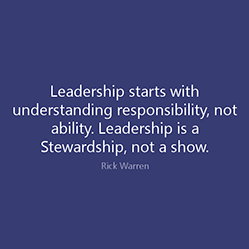 If you’re part of a large organization, chances are you were required to complete an annual data security eLearning program from your company’s LMS in the last month. I went through one myself last week, and paused when I read the question “Whose responsibility is data security?” The answers were: a) the IT team, b) the IT team and front desk security guard, c) management or d) every employee. The answer is obviously every employee, but that got me thinking about what other key corporate responsibilities rest on every leader’s shoulders.
If you’re part of a large organization, chances are you were required to complete an annual data security eLearning program from your company’s LMS in the last month. I went through one myself last week, and paused when I read the question “Whose responsibility is data security?” The answers were: a) the IT team, b) the IT team and front desk security guard, c) management or d) every employee. The answer is obviously every employee, but that got me thinking about what other key corporate responsibilities rest on every leader’s shoulders.
Here are six corporate needs that are every leader’s responsibility:
- Financial responsibility. Clearly the Finance department and Executive Board bear the bulk of the responsibility for the organization’s financial health, but that does not mean they are alone in that endeavor. As a leader, you’re likely given a budget at the beginning of the year. Spending wisely in places with maximum return on investment is everyone’s responsibility.
- Finding and mentoring high potential leaders. Human Resources may manage the high potential program, but every leader should take on ownership of identifying successors and mentoring them throughout their careers. Delegating and giving stretch assignments helps build confidence and the experience level of the next generation of leaders.
- Stopping and reporting harassment. While it’s obvious that every leader is responsible for ensuring no harassment takes place on his/her own team, the greater responsibility is identifying, reporting, and stopping harassment throughout the organization, even if it involves a peer or superior. No tolerance means no tolerance—no matter where it happens on the organizational chart.
- Recruitment. Just like the high potential program, while HR may bear the official responsibility for employee recruitment, every leader should be on the lookout for talent, whether it’s for your department or not. Spotting potential and inviting them into your company’s talent community is a shared responsibility.
- Brand ambassadorship. Sure your organization has a PR team, marketing team, and advertising budget, but the role you play is even more influential. Spread positive messages about your organization. Share stories that are deeper, and more meaningful, than what can be told in a commercial or advertisement. People listen to the stories their friends tell and build a personal connection with the brand as a result.
- Environmental friendliness. The waste you produce is waste your company produces. Think twice before hitting the print button. Car pool with coworkers who live nearby. Offer telecommuting options when possible. Helping the company reduce their carbon footprint isn’t just an “every leader responsibility,” it’s an “every human responsibility.”
